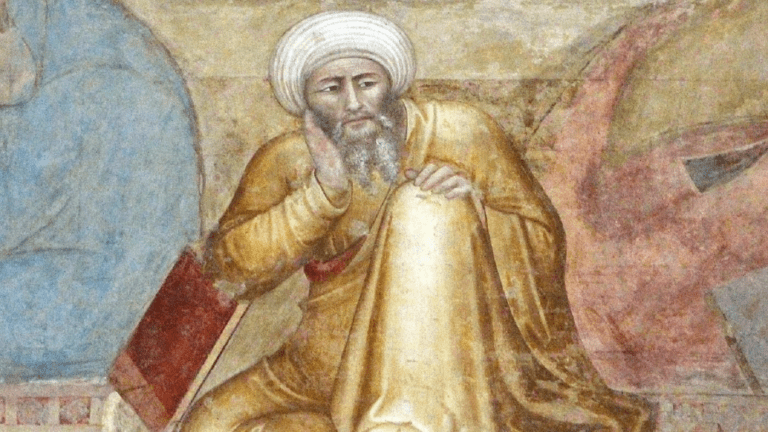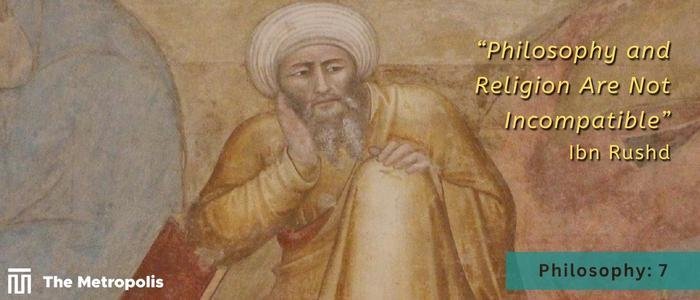Hasan Mahmud –
Abu Walid Muhammad Ibn Ahmad ibn Rushd, also known as Averroes in the West, was a Spanish-Arab philosopher and physician in the 12th century. He is regarded as one of the finest philosophers in Western philosophy history and was a key player in the Islamic Golden Age.
Ibn Rushd examined the connection between philosophy and religion in his writings and asserted that they were not incompatible. His philosophy is characterized by his ability to bring together Greek philosophy and Islamic theology, thus showing that philosophy and religion are not incompatible.

Ibn Rushd was born in Cordoba, Spain in 1126 and was educated in Islamic law and medicine. He served as the top judge of Seville and the court physician, among other important posts, in the Almohad dynasty’s court. His commentaries on Aristotle’s works written in Arabic are his most illustrious works, though he also wrote extensively on philosophy, medicine, and Islamic law.
Ibn Rushd believed that religion and philosophy were not in conflict with each other, but rather complementary. He maintained that philosophy served as both the theoretical underpinning and the practical application of religion. He held that although philosophy offered the conceptual framework for comprehending the natural world and the meaning of life, religion provided the moral principles that guided human behavior.
Ibn Rushd thought that philosophy may help people understand some theological notions like the existence of God, the nature of the soul, and the afterlife more deeply. In this way, philosophy may be used to reinforce and clarify religious ideas rather than undermine them.
Ibn Rushd also argued that philosophy and religion might be complementary. He held that although philosophy offers the intellectual foundation to comprehend why a person’s acts are right or bad, religion offers a moral framework that directs persons in their conduct. In this approach, religion offers the framework for moral action, whereas philosophy can assist people in making educated and moral decisions.
Ibn Rushd emphasized the value of applying logic to the interpretation of religious texts and beliefs. He held that religion should be subject to critical inquiry and analysis rather than being accepted without question. He felt that using reason to understand the world and ourselves was our responsibility and that there was no conflict between doing so and having faith.
Ibn Rushd’s philosophy was heavily influenced by Aristotle, and he was known as the “Commentator” because of his extensive commentaries on Aristotle’s works. He believed that Aristotle’s philosophy was the best logical and empirical way to comprehend the world and that it was crucial to comprehending Islamic teachings. The Quran, he contended, was not meant to be read literally but rather as a metaphorical portrayal of divine truths that might be comprehended via intellectual study.
Ibn Rushd’s ideas had a significant influence on Western culture, especially during the Renaissance. His Aristotelian commentary was widely read in Europe once it was translated into Latin, reviving interest in Aristotle and Greek philosophy. His ideas also influenced the development of scholasticism, a medieval philosophical and theological movement that sought to reconcile the teachings of the Church with the ideas of classical philosophers like Aristotle.
Ibn Rushd’s legacy can be seen in the works of many later philosophers, including Thomas Aquinas, who incorporated many of his ideas into his philosophy. Aquinas used Ibn Rushd’s ideas to support his case for the harmony of faith and reason because he considered Ibn Rushd as a link between Greek philosophy and Christian theology.
Ibn Rushd’s ideas are still having a big influence on how philosophy and religion are related now. However, this view was highly controversial in the Muslim world, as many believed that philosophy conflicted with the teachings of Islam. Ibn Rushd’s opponents contended that although religion was founded on faith and revelation, philosophy was founded on reason and was therefore naturally rational. They thought that philosophy was a danger to the Islamic faith and would cause skepticism and apostasy.
Ibn Rushd, however, did not think in this manner. He held that religious truths are not definable by reason but are instead revealed to humans by God. According to him, the purpose of reason and philosophy is to comprehend and justify fundamental truths, not to contest or refute them.
Ibn Rushd’s philosophy is also criticized for encouraging dualism, which divides the physical world from the spiritual world. Some contend that Islam’s core principles, which claim that the physical and spiritual worlds are intertwined and tied to one another, conflict with this dualism.
In response to this critique, Ibn Rushd claimed that the dualism he supports is not a denial of the interactions between the material and spiritual realms, but rather a method of comprehending the nature of reality. He held that the spiritual realm is the origin of all knowledge and wisdom and that the material world is merely the outward expression of the spiritual world.
Ibn Rushd’s idea is also criticized for advocating a sort of determinism that excludes human free will. Some claim that his worldview suggests that God has decided all that occurs in the world and that humans have no control over their own lives.
However, Ibn Rushd did not see it this way. He held that although people have free choice, God ultimately determines what they do. He believed that although people can make choices and decisions, God ultimately determines how those decisions will turn out.
Despite these criticisms, Ibn Rushd’s philosophy continues to be highly influential in the fields of philosophy and religion. Numerous thinkers and academics have been influenced by his theories regarding the connection between philosophy and religion throughout history, and his method for comprehending the essence of reality has been hotly contested.
In a world where religion and philosophy are often seen as conflicting, Ibn Rushd’s ideas continue to have relevance and impact. His philosophy is a reminder that philosophy and religion may coexist and that both can advance our knowledge of the universe and of ourselves.



